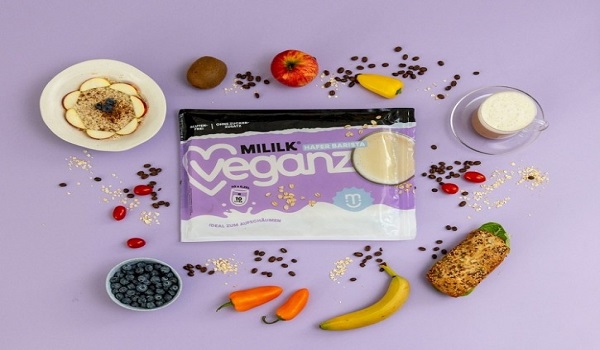The frontier of plant-based innovation sees a remarkable leap forward with the advent of 2D-printed oat milk, a revolutionary concept pioneered by German food brand Veganz. While 3D printing has garnered attention for its role in crafting custom food products, the emergence of 2D printing in the plant-based milk sector marks a paradigm shift in sustainability and efficiency.
Veganz’s innovative Mililk oat drink, derived from patented technology acquired from a New York-based lab, offers a novel solution to traditional oat milk production. By employing a screen-printing process on an industrial scale, Veganz creates a convenient, shelf-stable oat base that consumers can transform into milk by simply blending with water for 30 seconds.
Since its debut in October last year, Mililk has garnered praise for its simplicity, taste, and sustainability. With an ingredient list boasting only five natural components—fermented oats, rapeseed oil, locust bean gum, sea salt, and bourbon vanilla—Mililk stands out as a wholesome, additive-free alternative to conventional oat milk.
Yet, it’s the sustainability credentials of Mililk that truly shine. With packaging that is 85% lighter and utilizes 94% less material compared to traditional cartons, Mililk significantly reduces environmental impact and waste. Founder and CEO Jan Bredack underscores the absurdity of carton-packaged oat drinks, which primarily consist of water and contribute to unnecessary packaging waste.
The potential of 2D-printed oat milk extends beyond consumer markets, with Veganz eyeing lucrative opportunities in the foodservice sector. With plans to ramp up production capacity to meet burgeoning demand, Veganz aims to capitalize on the growing appetite for sustainable, plant-based alternatives in restaurants, cafes, and other hospitality venues.
As Veganz expands its footprint across Germany, Austria, and Switzerland, anticipation mounts among consumers in other European countries. With promising prospects in the foodservice arena and ongoing product development efforts, the future looks bright for 2D-printed plant-based milk as a game-changer in the evolving landscape of sustainable food innovation.


